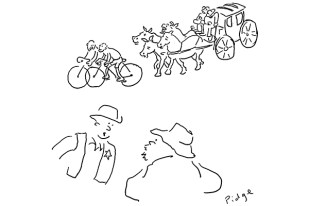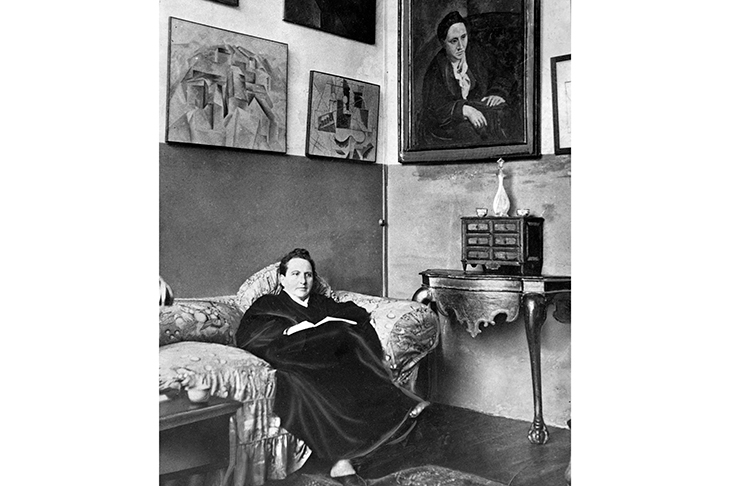For more than 100 years Paris has been as much a symbol and a myth as a geographical reality. The enchantment dates back to the end of the 19th century, when ‘le bordel de l’Europe’, in words quoted by Marie-José Gransard, was transformed into ‘la capitale de l’amour’. In Twentieth Century Paris she traces the growth of the community of mostly foreign artists and writers who created this international brand.
By the 1890s Paris had recovered from defeat by Prussia and the atrocity of Bismarck’s bombardment in 1870 and had become the capital of more than ‘l’amour’.It ran a colonial empire powerful enough to deprive the Kaiser of his ‘place in the sun’. At the same time, it gained the reputation as a centre of individual freedom, a city that was tolerant of eccentricity and behaviour that was elsewhere regarded as immoral or against the law. Samuel Beckett put it best, returning after years of absence: ‘Being back here’, he wrote, is ‘like coming out of jail in April.’

There were practical reasons for the city’s popularity with young writers and artists. Perhaps the most important was the abundance of cheap accommodation. Haussmann’s sanitary but ruthless achievements between 1855 and 1880 had flattened hills and destroyed entire districts. Thousands of hovels were replaced by apartment blocks for the working inhabitants. In what remained of the older Paris, garrets, studios and cheap hotels became widely available. Oscar Wilde, who died in one of those hotels in 1900 — famously complaining about the wallpaper — might be gratified to see that there is now a plaque by the entrance recording his departure, though the prices have long since risen beyond the means of an impoverished genius.
First Montmartre, in the north, and then Montparnasse, on the Left Bank, became havens for men and women succumbing to the irresistible temptation to transform themselves into someone completely different. The world of émigré Paris — ‘the cultural capital of the world’ — was to some extent a parallel universe, disconnected from the real life of the city, which was marked by regular episodes of brutal violence. In 1914, when war broke out, the fantasy survived. Many of the immigré artists dug in for the duration, and Cubism flowered, exploded and died while thousands starved within range of the German guns.
Camus and Beckett could watch Hemingway make a fool of himself, tearing around, draped in bandoliers
The remains of the city’s successive crises are visible to this day. The graves of the communards in Père Lachaise, the church of St Gervais in the Marais shattered by a German shell in 1918, the wall plaques dotted around the 6th arrondissement recording the resisters shot down in August 1944, the Métro station where supporters of Algerian nationalism were crushed to death by the police in 1962: all this the native Parisians survived as best they could, while the pageant of 20th-century literature passed by.
Its several hundred members, as assembled by Gransard, make up a bizarre but colourful pot-pourri: Harold Acton and Hannah Arendt, James Baldwin, Burroughs and Capote, and so on to Nabokov, Stein, Toklas, Whitman, Woolf and Yeats. Trotsky and Lenin both fell in love in Paris, and Trotsky’s son was poisoned in the 16th arrondissement in an expensive private hospital by Stalin’s secret police (plus ça change…). The days of liberation in 1944 marked a brief intersection of fantasy and reality; Camus and Beckett, who had risked torture and death in the Resistance, could watch Hemingway making a fool of himself, tearing around in a jeep, draped in bandoliers.
Twentieth Century Paris is more of a literary companion than a guide: a roll call of creativity, based on wide research, with a wealth of anecdote. In 1938 James Joyce invited Peggy Guggenheim and Samuel Beckett to dine at Fouquet’s, which was, surprisingly, his favourite restaurant — when he could afford it. Thirty years earlier, Lenin had tried to keep warm by making one drink last all evening at La Rotonde. But any reader attempting to navigate from one venue to another will need a different guidebook, since the chapters are not arranged by district but by themes — ‘Exiles’, ‘Flappers’ or ‘The Lost Generation’. There are a number of omissions — Sybille Bedford, Mavis Gallant and Arthur Koestler — while Julien Green and Christopher Logue make only nominal appearances.
Some of those writers who reinvented themselves in Paris made better use of the opportunity than others. It was in the Quartier Latin in the 1930s that Aimé Césaire and Léopold Senghor conceived the concept of négritude, a refusal of victimhood, an assertion of pride and a celebration of African identity. Today the city is once more under siege, this time by an army of desperate migrants from Africa who camp out beneath the arches and viaducts of the périphérique that circles the old city walls. The motorway was built on land cleared to provide French artillery with a decent field of fire in anticipation of the next Prussian incursion. Fantasy succumbing to reality once again.






Comments